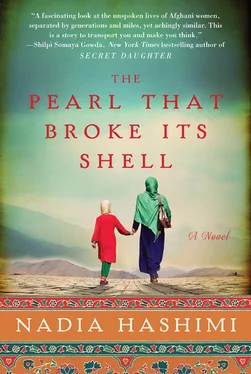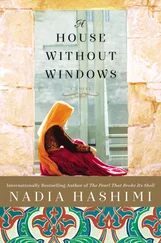I watched her recount the story. She was looking out the window, the cars’ tires spinning up clouds of dust that obscured the view. It was as if she wasn’t talking to me, just reliving the memory.
“I had to get everyone, let everyone know. What a day. But that’s how she died — unappreciative of what I was doing up until her very last breath. That’s the kind of hard-hearted woman she was.”
In other circumstances, I might have told Bibi Gulalai that I understood, that I could sympathize with her.
“You don’t know how lucky you are,” she said, suddenly remembering I was sitting beside her.
That was my only visit to my son’s grave. I knew Abdul Khaliq opposed my going there. Truthfully, I wasn’t even sure I was strong enough to go back. It wasn’t easy. I lay awake all that night and the next wondering if Jahangir felt like he was suffocating in there. Shahnaz heard my crying through the thin walls and groaned in frustration. I couldn’t get my mind off my little boy.
When Badriya came to me again to ask if I wanted to go back to Kabul, I thought about it and made a decision that I thought Khala Shaima would approve of. I packed my bag, my heart heavy with guilt for leaving my son behind again.
I thought of the cemetery, the rows of headstones, simple and hand carved. Some old, some new. The finches had watched us until we left. I saw them chirping to one another as we drove off and then, one by one, the birds had flown away.
It wasn’t easy to stay focused on the work this time. Halfway into a parliamentarian’s speech, I would realize I had no idea what he was talking about. My mind had drifted, remembering the last time I’d bathed my son. Or fed him halva, his favorite food.
Badriya noticed but her exasperation was tempered by sympathy. Most of the time. She was hardly paying attention herself. She spent most of the session pretending to look at papers in front of her when I could see she was watching the people in the room. For a woman who had spent the greater part of her life confined by the walls of her husband’s house, every session was a spectacle.
She was even more lax with me than before, which didn’t mean much except that I spent more time with Hamida and Sufia and less time with her or our security guard and driver. The ladies were kind to me. When Badriya had returned to Kabul without me, they’d asked about me several times. She’d made vague excuses until she finally told them about Jahangir.
Sufia’s arms around me were more comforting than I could have imagined. Hamida shook her head and told me of the three-year-old son she’d lost to some infection. She and her husband hadn’t had the money at the time to pay for medications.
I forced a smile and nodded, appreciative of their warmth but not wanting to talk about what had happened. There was too much there and I still felt a fresh guilt for leaving my dead son behind.
The home Abdul Khaliq was fixing had not yet been finished, so we continued to stay at the hotel. I floated through my daily routine in a perpetual state of misery, wondering from time to time why I bothered to do any of it at all. I think I was driven by fear of my husband. And because I didn’t know what else to do.
Badriya was dropping hints here and there about our husband’s new prospect. As much as she didn’t want to talk to me, there was no one else around and there were things that she could not bottle up.
“I’m not supposed to say anything. I only know because, of course, he thought it was right to share this information with me since I’m the first wife,” she said with one hand over her chest as she spoke of her own importance. “The girl’s name is Khatol. She’s very beautiful, they say. And Abdul Khaliq has known her brother for a long time. Her brother is a well-respected man. He fought alongside Abdul Khaliq but now he owes a lot of money to our husband. He showed him and his family much kindness. Even sent them food when he heard they didn’t even have bread.”
“But what will happen to… to the rest of us?” I didn’t want Badriya to know that I’d heard her conversation with Bibi Gulalai.
“The rest of us? Nothing! Why should anything happen to the rest of us?” she said, and busied herself cleaning a grease spot from her dress. “Aren’t you going to that silly class with your friends?”
She wouldn’t say anything more than that, nothing about my husband’s plans to keep in line with the hadith . It wasn’t in her interests to alert me.
I didn’t understand why my husband suddenly found it so important that he follow the hadith . He wasn’t a man who let rules dictate his decisions. If he wanted to have five wives, or twenty-five for that matter, he would.
Thick, industrial smoke from a million exhaust pipes blackened Kabul’s air. Badriya coughed violently. I would ask, only because she would bring it up later if I didn’t, if she wanted to join the ladies and me at the resource center. Each time she would wave me off.
“I’m not wasting my time with those busybodies.”
Maroof and our bodyguard stayed with her because she was the more important wife and because she always claimed to be considering going to visit her cousin across town. As far as I could tell, she never actually left our room. She knew better. She knew word would get back to our husband. Badriya’s survival instincts were strong.
I spent my evenings in the training center under Ms. Franklin’s tutelage. I was getting better at navigating my way through the computer programs. For practice, I would type letters to my sisters Shahla, Rohila, and Sitara — letters that were never sent. The woman from the shelter, Fakhria, came from time to time and brought with her stories of girls who had fled from home, hungry for a new chance. Their shelter functioned on money raised in the United States and it was becoming obvious that she was trying to garner Hamida and Sufia’s sympathy, hoping to secure some funding from the parliament. I wanted to tell her that she was wasting her breath. Even I, the lowly assistant to a parliamentarian, could have told her there was no chance of getting the jirga to allocate money to a shelter for women who had run away from their husbands. In fact, I’d heard several people say the shelters were nothing more than brothels. I didn’t think it was true, but others did.
Four weeks remained until the parliament’s winter break. Four weeks left for me to attend class at the training center, four weeks of Ms. Franklin patting my shoulder in praise, four weeks left of Hamida and Sufia, instead of cooking and cleaning.
I wondered how Khala Shaima was doing. She looked worse each time I saw her. Still, she had outlived both Parwin and Jahangir. Their deaths had taught me that anything was possible, and that death was closer than I wanted to believe.
“I’m an old woman,” Khala Shaima had told me before I left for Kabul. “I’ve cheated the angel Azrael more than once but he’ll come and claim my last breath soon enough.”
“Khala -jan, don’t say such a thing,” I said, protesting.
“Bah. I’ve wanted to be around only so I can look after you girls, to tell you the truth. Nothing else matters much. But I can’t slip through his fingers forever. It’s like the story of that man — did I tell you that one?”
“No, Khala -jan . You’ve only told us about Bibi Shekiba.”
“Ah, and I hope you’ve learned something from her story. You are her legacy, after all. Remember, your great-great-grandmother was Bibi Shekiba, guard to the king’s harem.
“ Dokhtar-em, my dear, I’m not well. You are not a naïve girl anymore. It will give my heart peace if you can tell me that every story I’ve told, every mattal I’ve shared, that you’ve gotten some wisdom and courage from it. Remember where you come from. Bibi Shekiba is not a fairy tale. She is your great-great-grandmother. Her blood courses through your veins and gives strength to your spirit. Always walk with your head high. You are the descendant of a somebody, not a nobody.” She sighed heavily, which turned into a long, exasperated cough. She took a minute to catch her breath before she continued.
Читать дальше












